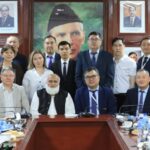Seminar on “The Rise of China in the Historical Perspective”
Once China was a sleeping dragon but now it has started ‘shaking’ the world with its robust economy, flourishing civilization and rich culture that derives its strength from Confucianism, said Prof. Dr. James Eldin Reed, an internationally recognized historian and educationist.
He was speaking as a keynote speaker at a seminar on “The Rise of China in the Historical Perspective” organized here by the History Department of Quaid-i-Azam University (QAU) in collaboration with QAU Fulbright Alumni Chapter.
Dr. Reed highlighted three major aspects of China that according to him provide it with great strength and diversity including civilization, status as a Nation State and vast economic landscape.
He said Chinese culture derives its strength from Confucianism that is not only considered ‘historical heart’ of its civilianization but also ensures good governance and provides inherent ‘superiority’ in the comity of nations.
Dilating upon the idea of Nation State in China he said it emerged after ‘painful’ experiences and humiliation at the hands of the Western powers for more than a century but undoubtedly it later provided real essence and strong footing to relatively weak nation.
Dr. James Eldin Reed said imperial powers did not get direct control of China’s land instead they managed to ensure their rule in major coastal cities and let the local puppet leadership to run affairs in other areas.
“Lack of equal opportunities, racial discrimination and humiliating attitude of Imperial powers resulted in emergence of Chinese nationalism that enabled people to raise their voice and decide about their future on their own,” he said.
He said that rapid industrialization in East Asia after World War II paved the way for many countries to embark upon the path of economic prosperity especially in early 1960s and China along with Japan, Taiwan, South Korea and Singapore raised its head as one of the biggest Asian tigers.
Underlining various factors responsible for its fast-track economic growth he said China first of all developed its manufacturing industry and established units to produce Iron and Steel. Secondly, it took advantage of wage differential and finally they heavily invested in infrastructure and higher education sector.
Dr. Reed said China also successfully maintained balance between mercantilism and free economy but still it needs to keep momentum to address some of the vital challenges in the economic sector.
He underlined the fact that China should get rid of its isolation at the international level and develop a better level of understanding with other developed countries to build its global image as a fast growing country.
QAU Vice-Chancellor Prof. Dr. Masoom Yasinzai, Chairperson, Department of History, Dr. Razia Sultana, Dean Social Sciences Dr. Naveed-i-Rahat, a large number of faculty members and students attended the seminar.
 PM’s Laptop Scheme’s Provisional List has been shared with Department Focal Person. Check your status, please
PM’s Laptop Scheme’s Provisional List has been shared with Department Focal Person. Check your status, please








